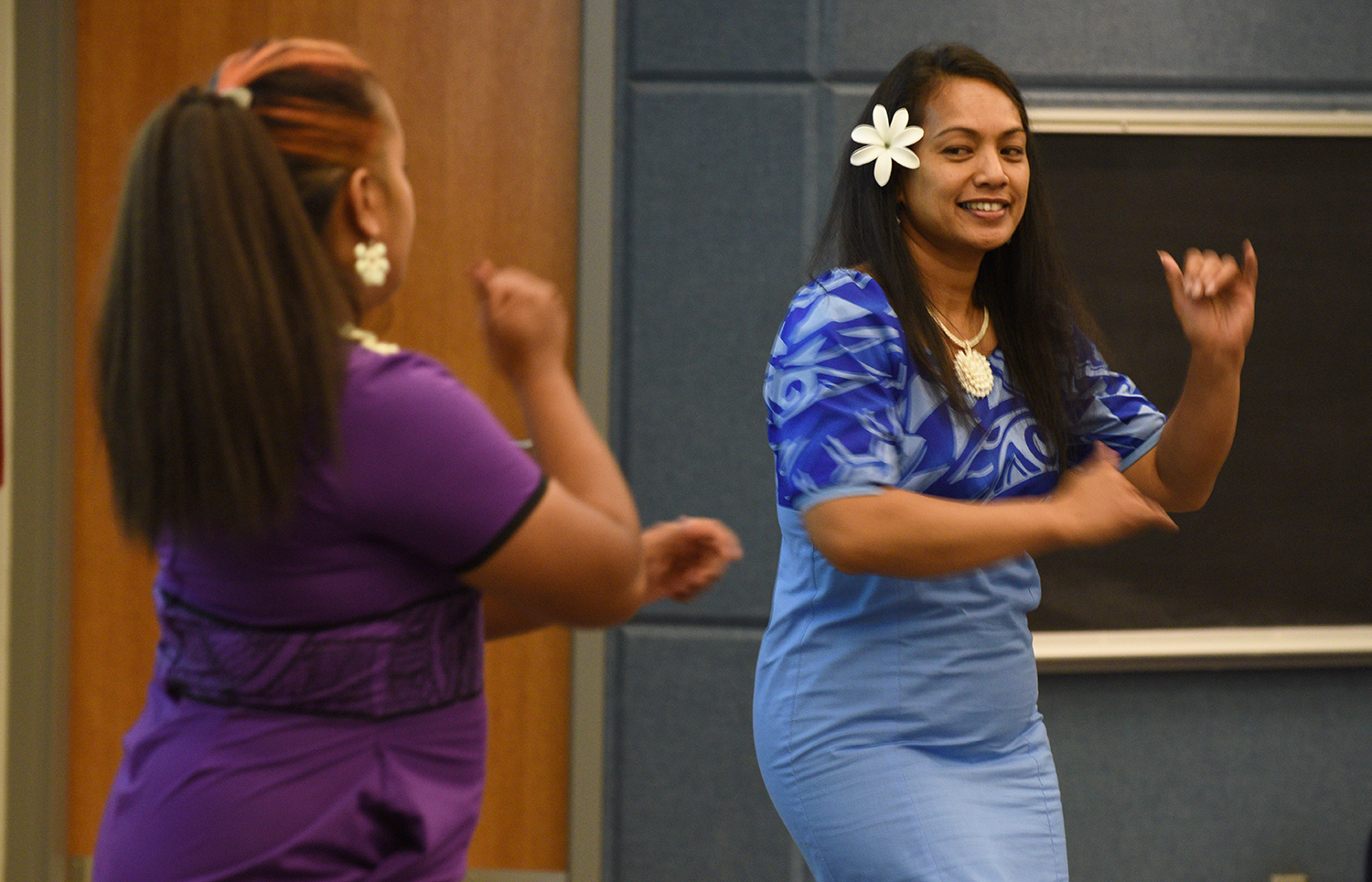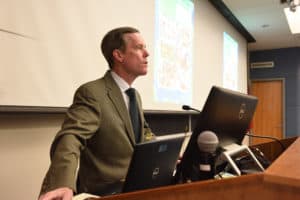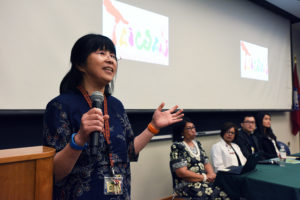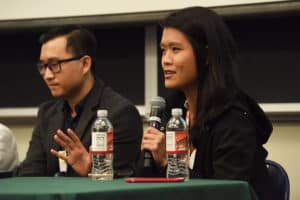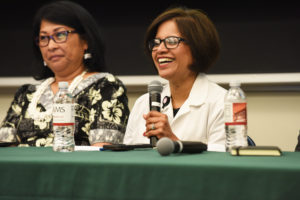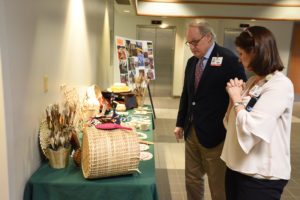UAMS Celebrates Asian and Pacific Islander Heritage Month
| Guests took a tour of southeast Asia and the islands of the western Pacific Ocean as panelists from the Philippines, Taiwan, Vietnam, India and the Marshall Islands shared the experiences and memories of their native cultures and countries recently at UAMS
The May 1 event, “Our Voices, Our Stories,” was part of the seventh annual celebration of Asian and Pacific Islander Heritage Month at UAMS. It featured Asian-inspired lunches and a dance performance by the Ozark Islanders dance group.
“These diverse cultures are an incredibly important part of our American fabric. Their contributions to our nation and our state are countless. In so many fields, and especially in health care and science, they continue to make America a much better and stronger place for all of us,” said UAMS Chancellor Cam Patterson, M.D., MBA.
Patterson noted the institution’s devotion to serving the health needs of a diverse population, exemplified by the Center for Pacific Islander Health at the UAMS Northwest Regional Campus, the only one of its kind in the world.
“We at UAMS are fortunate to have such a diverse population at our institution,” he said. “It’s important that we listen to and respect each other’s voices and stories. We also need to support each other and embrace our differences. Bigotry and divisiveness are not welcome at UAMS and should have no place in our institution, our state, our nation or our world.”
Kevin Thomas, a second-year student in the M.D./Ph.D. program originally from India, welcomed guests and related arriving in tiny Pocahontas, Arkansas, as a second grader. He was both overwhelmed by the difference and heartened by the warm reception.
Moderating the day’s discussion was Teresita Angtuaco, M.D., a professor of radiology, obstetrics and gynecology in the College of Medicine and native of the Philippines. She talked about growing up on a tiny island, one of thousands that make up the country, and traveling to the capital of Manila to attend medical school. She also related a myth she heard in her youth about the country’s creation.
“When I was in grade school my teacher told us we were originally attached to the main continent of Asia,” she said. “But apparently one of our rulers made the gods mad, so this god gathered up all the islands and cast them into the sea away from the mainland. I believed that when I was younger.”
Panelist Tung-chin Chiang, Ph.D., an assistant professor in the College of Public Health, shared an overview of her home Taiwan, including facts about its geography and demographics. She also spoke about what it’s like to visit the night markets in the streets of the capital, Taipei.
“If you don’t bargain and you buy at the original price, you’re a tourist,” she said.
Since “food is the nation’s heart,” she noted she misses the nation’s variety of fruits the most, like guava, star fruit and passion fruit.
Food is also a big part of culture for second-year medical student Vi Tran, who came from Vietnam 10 years ago with parents who were seeking more educational opportunities for her and her older sister.
“The cuisine is the best, and that may be what I’m most proud of from Vietnam,” she said. “We have pho. I remember a few years ago people finally recognized the word bahn mi as an official word, so I no longer had to explain it to people.”
Nursing student Phuong Gip talked about his family’s journey as refugees, dodging landmines to escape the jungles of Vietnam after the war, swimming with sharks in the ocean to reach Hong Kong, surviving the monsoons in a refugee camp in the Philippines and finally flying to San Francisco to resettle in the U.S.
“It’s important to share our voices and stories to build understanding and appreciation for the unique cultural perspectives and experiences we bring to this country,” he said.
Sara Tariq, M.D., associate dean for student affairs in the College of Medicine, related her own unique story, being born in Alabama. Her father, a minority Muslim in India, escaped poverty and communal violence to arrive in the Jim Crow south in the 1960s. He went on to earn master’s and doctoral degrees, then brought his wife over and started a family. They assimilated, but kept close to their roots by speaking urdu in the home and making frequent trips back to India.
“I think anyone who classifies yourself or has been classified as ‘other,’ you know what the challenges are. There’s not a lot of representation, of people who look like you. I grew up in the ‘70s and ‘80s, and I remember in school when there were just three circles, when you filled out forms, with ‘white,’ ‘black’ and ‘other.’ Well I didn’t like being an ‘other.’”
While things have changed for the better in many ways, Tariq said, she still faces unique cultural experiences even today, especially being married to a Pakistani, “because India and Pakistan tend to not be friends on many levels, but culturally we’re very similar.”
Lynda Riklon, whose husband is the medical director of the Center for Pacific Islander Health, comes from the Marshall Islands and spoke about its challenges with education, employment and health, specifically given its history as a testing ground while America developed atomic weapons. Because of that history, the Marshallese can live and work in America without visas. Arkansas is home to the largest population of native Marshallese outside the islands.
“My husband I moved to Northwest Arkansas two years ago,” she said. “We moved there because were told there are almost 14,000 Marshallese there. It’s like a second home to us. Everywhere you go you see Marshallese.”
Still, living in the U.S. is not without its challenges. She said she misses the fresh fish from home. Every time she returns, she brings five or six coolers packed with Tyson chicken to trade for fish she can bring back to Arkansas.
When asked, nearly all participants said that while UAMS has done great work in emphasizing and respecting diversity, more still can be done. Whether it’s a more common rotation of cultural dishes served by campus dining or increased efforts to bring new and different voices to leadership training and decision making, there’s always room for improvement, they said.
“I agree that it’s good to create events like this where we celebrate diversity and provide the opportunity to share stories and experiences and make connections,” said Gip.
